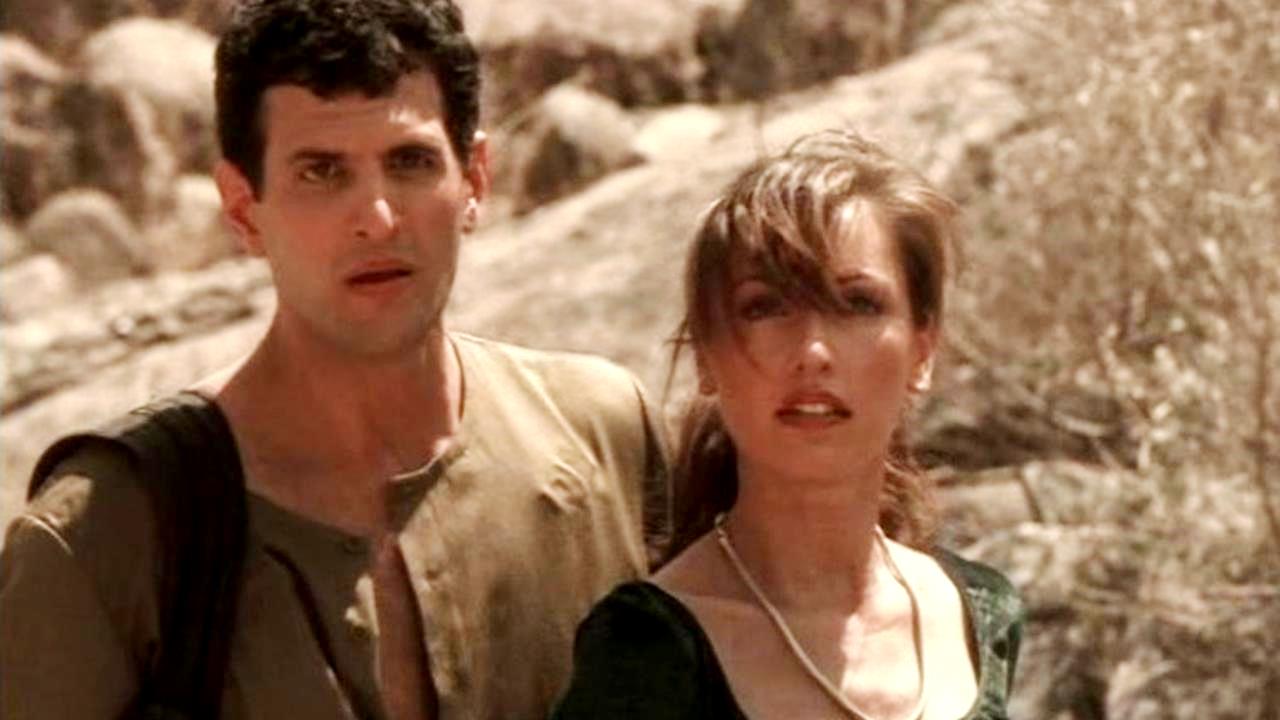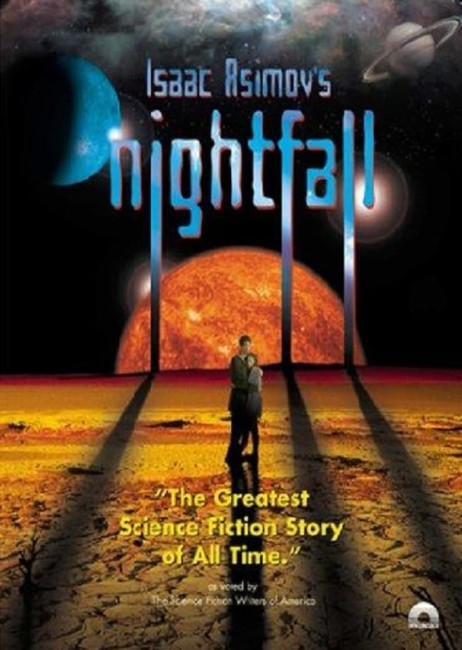USA. 2000.
Crew
Director – Gwyneth Gibby, Screenplay – John William Corrington, Michael Druxman & Gwyneth Gibby, Based on the Short Story by Isaac Asimov, Producers – Roger Corman & Ramoji Rao, Photography – Abhik Mukhopadhyay, Music – Brad Segal & Nic ten Broek, Visual Effects – Max Ink Cafe, L.L.C. (Supervisor – Todd Sheridan Perry), Special Effects – Mahon Kumar & Krishna Rathod, Production Design – Nitish Roy. Production Company – Concorde,
Cast
Jennifer Burns (Illyra), Joseph Hodge (Metron), Winsome Brown (Sheerin), David Carradine (Gnomen), Ashish Vidyarthi (Kopton), Tony Mirchandani (Mecco), Pradeep Singh Rawat (Django), Smitra Hai (Darkling Woman)
Plot
The planet Aeon is surrounded by six suns and its people have never known night. The archaeologist Illyra is outraged when The Watchers, the conservative religious order that wield a strong influence in the society, close off and refuse access to a dig that has uncovered an ancient catacomb. She sneaks in and finds several artifacts. After being attacked by the snakes there, she is saved by Metron, a friendly Watcher who has psychic powers. Her father, the renowned academic Gnomen, is trying to understand why every thousand years there is a catastrophe that completely destroys the society of Aeon. Illyra gets Metron to take her to a cave in the desert in search of more ancient artifacts. There she discovers a series of finds that makes her realise that every thousand years there is a rare alignment where an unseen planet creates a total eclipse of all six suns, bringing about nightfall on Aeon. The darkness becomes so frightening to a people that have never known it before that the entire society goes insane. She now realises that such an eclipse is not far away from occurring once again.
Isaac Asimov (1920-92) is one of the great names in science-fiction literature. In his lifetime, Asimov was an extraordinarily prolific writer, not just in fiction but in a series of books on almost every topic under the sun, principally popular science but everything else from mathematics and history to Bible stories. He started out in the 1940s as a protege of the influential publisher John W. Campbell, Jr, the editor of Astounding, where he wrote the stories that became the basis of his two most famous works – the Foundation series and the I, Robot books.
Quite possibly Asimov’s single most famous short story is Nightfall (1941), which was published in Astounding. This was inspired by a quote from Ralph Waldo Emerson (which is repeated at the end of the film here): “If the stars should appear one night in a thousand years, how would men believe and adore, and preserve for many generations the remembrance of the city of God.” The setting of the story is the planet Lagash, which is at the centre of a solar system that has six suns, meaning that it only experiences nightfall (ie. a total eclipse) once every thousand years, where the total fear produced by such causes the population to go insane. It has been regarded as one of the great science-fiction short stories of all time. Asimov later expanded Nightfall into his grand unified universe of stories and collaborated with Robert Silverberg on a novel-length version Nightfall (1990).
For whatever reasons, the rights to the story fell into the hands of low-budget producer Roger Corman who oversaw two different film versions, the poorly received Nightfall (1988) and this no-better received second version. The script is co-written by John William Corrington who had co-written The Omega Man (1971) and Battle for the Planet of the Apes (1973). Interestingly, Corrington died in 1988, suggesting that Corman had been sitting on the script for more than a decade. Director Gwyneth Gibby had worked for Roger Corman as an editor and in various capacities and was granted the director’s chair on several films for him with Marquis de Sade (1996), Eruption (1997), The Phantom Eye (mini-series, 1999) and Black Scorpion Returns (2001).

Any film version of Nightfall is stuck with one essential problem – the story essentially is its punchline “a planet experiences night only once every thousand years.” It is a problem that even the short story and especially the full-length novel expansion face – the scenes set around the university with astronomers and archaeologists piecing together what is about to happen contrasted with the activities of the cult are largely only padding before we get to the punchline. (And for anyone who has read any science-fiction history, the punchline is a well familiar one). I had read the story so the ending in the film was no surprise to me, although by the same token it is hard to believe that seeing the stars come out at the end of the film would be a big wow to any contemporary audiences not familiar with the story either. You suspect that the better destination for the story would be as a half-hour episode of a tv anthology series such as The Twilight Zone (1959-63), Out of the Unknown (1965-71) or Masters of Science Fiction (2007) where the brevity of the televised episode would make it work with much more snappiness and less padding.
This version of the story sadly befalls a typical Roger Corman low-budget. The production has gone to shoot in India, which is at least able to provide some arid locations, temples and busy marketplaces that the film would otherwise not have been able to afford. This does lead to a certain implied racism that is impossible not to notice where all of the educated intellectuals are portrayed by the imported Caucasian US actors, while the supporting roles, mostly among the Watchers and the general extras in the background are all cast with Indian actors. It tends to send out the signal that associates whites with rationalism and educated superiority and the Indians with superstitious and ignorant peasantry.
In all other regards, Nightfall 2000 is a poorly pieced together film. There are pathetically unchoreographed fights – at one point, Winsome Brown tries to hold off an assailant who is wielding a massive sword using her handbag. The later scenes progress to a level of canned action – riots by the cult, a badly directed scene with Jennifer Burns facing snakes in the dig and being saved by Joseph Hodge using his ill-explained psychic powers. The film is also crippled by an annoyingly over-emphatic atonal score that is constantly trying to drum up scenes that are not interesting.
David Carradine is the only imported name with any recognisable profile and only has a handful of scenes. The lead is largely taken by Jennifer Burns, the grown-up teen actress who played the warrior girl Azabeth Siege in the Josh Kirby… Time Warrior! films. The unknown Joseph Hodge seems too weedy to be the dashing romantic hero that his character is supposed to be.
Isaac Asimov’s other films works include:- several stories adapted for the British science-fiction anthology tv series Out of the Unknown (1965-71); acting as scientific advisor on Star Trek – The Motion Picture (1979); scientific advisor on the tv series Salvage 1 (1979); the English-language script for the US release of the French animated film Gandahar/Light Years (1988); the premise of the excellent but short-lived tv series Probe (1988); loose inspiration to the tv movie The Android Affair (1996); one of his stories adapted as Chris Columbus’s Bicentennial Man (1999); his book forming the basis of the Will Smith-starring I, Robot (2004); and the tv series Foundation (2021- ). Asimov is also frequently misidentified as having written the classic science-fiction film Fantastic Voyage (1966), or that the film is based on his book, when in fact all that he wrote was the novelisation of the film.
Full film available here


